Samsung Galaxy Note 3 Review
by Brian Klug on October 1, 2013 9:00 AM EST- Posted in
- Smartphones
- Samsung
- Mobile
- Android 4.3
- galaxy note 3
CPU Performance
The original Note I played with was based on Qualcomm’s APQ8060 platform with MDM9200 baseband (the so-called Fusion 2 platform) and was for its time a pretty awesome piece of kit, combining LTE and a dual core SoC. The Note 2 I played with next was based on Samsung’s own Exynos 4412 SoC with quad core Cortex A9 at 1.6 GHz and Mali–400MP4 GPU. For the Note 3, I’m looking at a T-Mobile variant (SM-N900T if you want to be exact about it) which means it includes a Snapdragon 800 SoC, and Samsung has gone for the 2.3 GHz bin (really 2.265 GHz rounded up). Inside are 4 Krait 400 CPUs running at up to 2.3 GHz, and Adreno 330 graphics at up to 450 MHz, all built on TSMC’s 28nm HPM HK-MG process.
I should note that this is MSM8974 and not MSM8974AB which oddly enough one of Qualcomm’s customers already announced (Xiaomi for the Mi3) which boosts GPU clocks up to 550 MHz and the LPDDR3 memory interface up to 933 MHz, among a few other changes. I’ve confirmed that GPU clocks on the Note 3 are indeed maxing out at 450 MHz, and quite honestly it’s a bit early for 8974AB in the first place, though it wouldn’t surprise me to see Samsung eventually get that faster bin at some point and put it in something.
I should mention that the Note 3 (like many other Android devices - SGS4, HTC One) detects certain benchmarks and ensures CPU frequencies are running at max while running them, rather than relying on the benchmark workload to organically drive DVFS to those frequencies. Max supported CPU frequency is never exceeded in this process, the platform simply primes itself for running those tests as soon as they're detected. The impact is likely small since most of these tests should drive CPU frequencies to their max state regardless (at least on the CPU side), but I'm going to make it a point to call out this behavior whenever I see it from now on. Make no mistake, this is cheating plain and simple. It's a stupid cheat that most Android OEMs seem to be ok with and honestly isn't worth the effort. Update: Of our CPU tests only AndEBench is affected exclusively by Samsung's optimizations, the performance gain appears to be around 4%. Vellamo is gamed by all of the Snapdragon 800 platforms we have here (ASUS, LG and Samsung). None of this is ok and we want it to stop, but I'm assuming it's not going to. In light of that we're working with all of the benchmark vendors we use to detect and disable any cheats as we find them. We have renamed versions of nearly all of our benchmarks and will have uniquely named versions of all future benchmarks we use. We'll be repopulating our Bench data where appropriate.
CPU performance is honestly excellent. The Galaxy Note 3 is more or less the fastest Android smartphone we've tested up to this point. In the situations where we can do cross platform (OS/browser) comparisons, it isn't quite as fast as the iPhone 5s but in some cases it comes close.
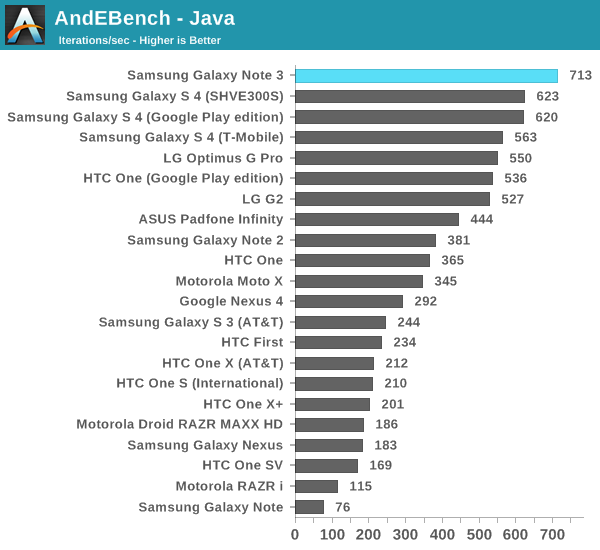
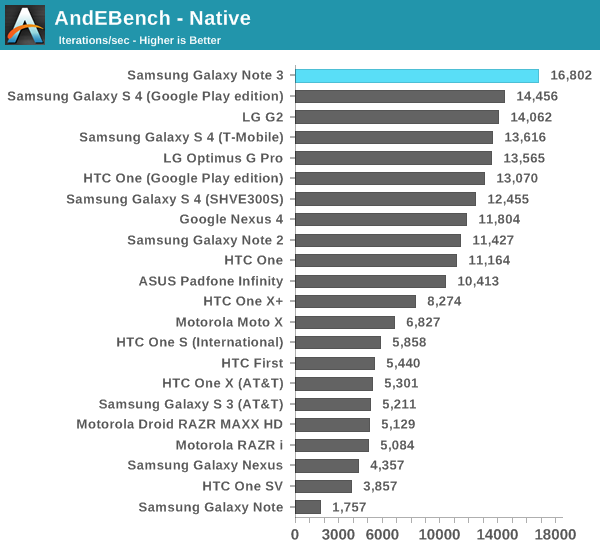
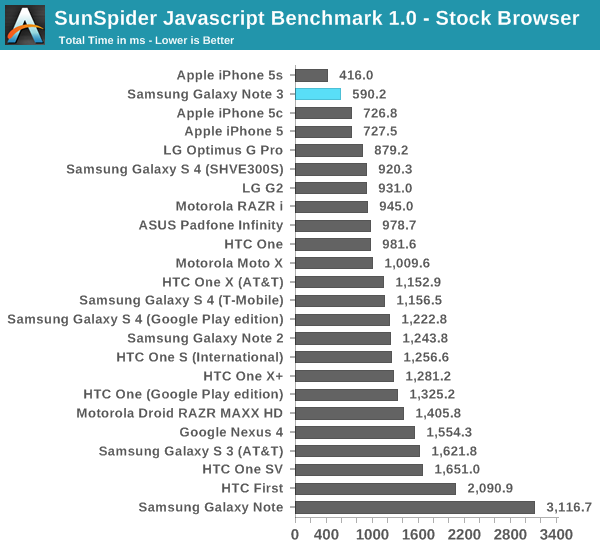
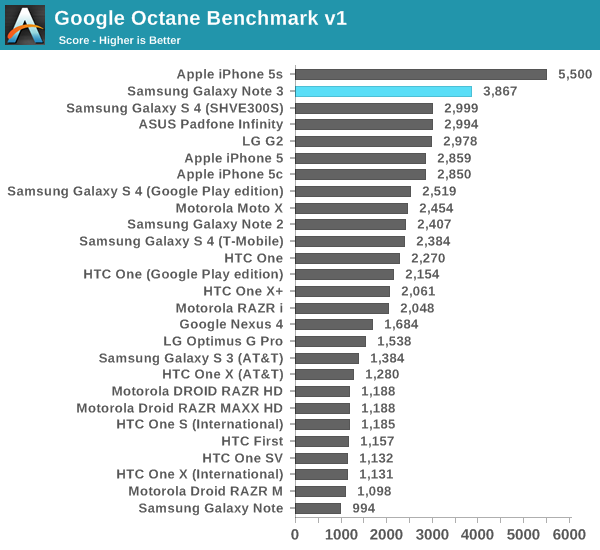
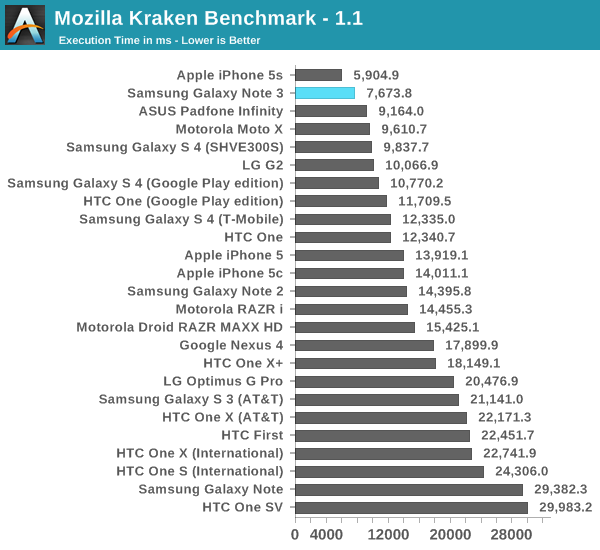
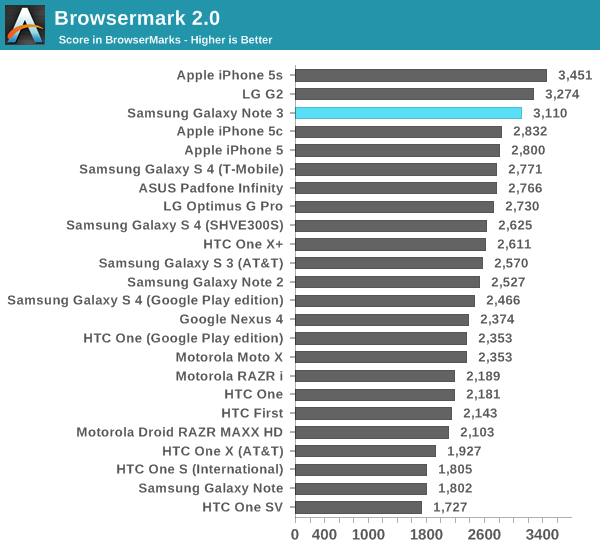
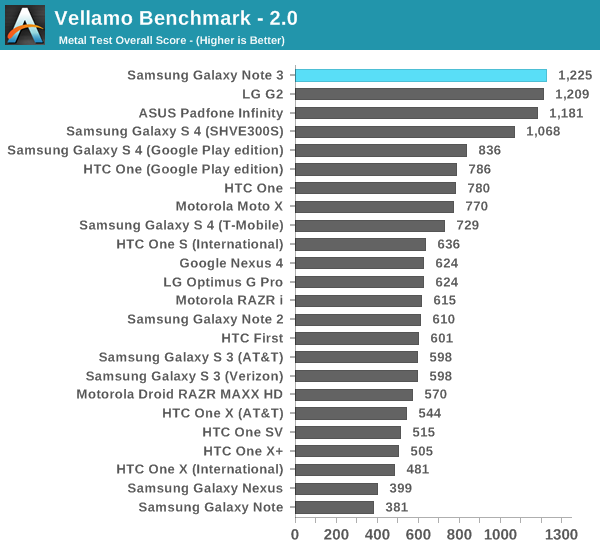
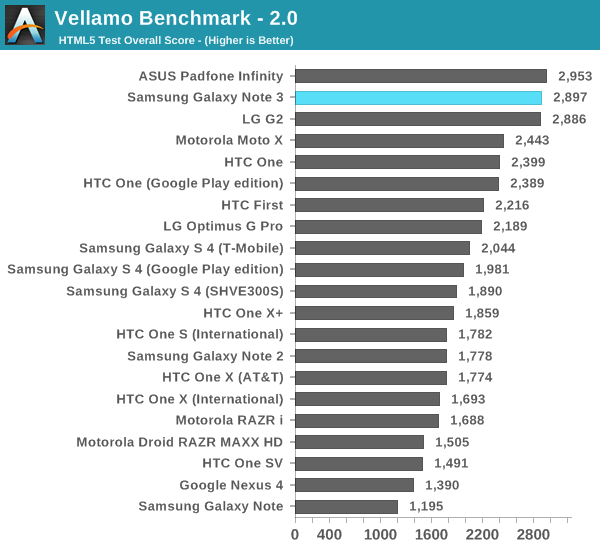
GPU Performance
Samsung definitely likes to win, and the Galaxy Note 3 walks away with the GPU performance crown in literally every single offscreen test we've got here. The onscreen tests are obviously governed by display resolution, but all things being equal the Note 3 manages to get the edge over the PowerVR G6430 in Apple's iPhone 5s. It's also interesting to note that the Galaxy Note 3 appears to outperform all other Snapdragon 800 smartphones we've tested thus far. There's a couple of potential explanations here. First, the Galaxy Note 3 is using newer drivers than any of the other S800 platforms we've tested:
Note 3: 04.03.00.125.077
Padfone: 04.02.02.050.116
G2: 4.02.02.050.141
Secondly, it's unclear how much the manual CPU DVFS setting upon benchmark launch is influencing things - although I suspect it's significant in the case of something like 3DMark.
Finally each manufacturer has the ability to define their own thermal limits/governor behavior, it could simply be that Samsung is a bit more aggressive on this front. We honestly haven't had enough time to dig into finding out exactly what's going on here (Samsung gave us less than a week to review 3 devices), but the end result are some incredibly quick scores for the Note 3. If I had to guess I'd assume it's actually a combination of all three vectors: drivers, high CPU frequencies and being more lenient with thermals.
Update: GFXBench 2.7 isn't affected by any optimizations here, but Basemark X and 3DMark are. We expect the Note 3's performance is inflated by somewhere in the 3 - 10% range. We're working on neutralizing this optimization across our entire suite.
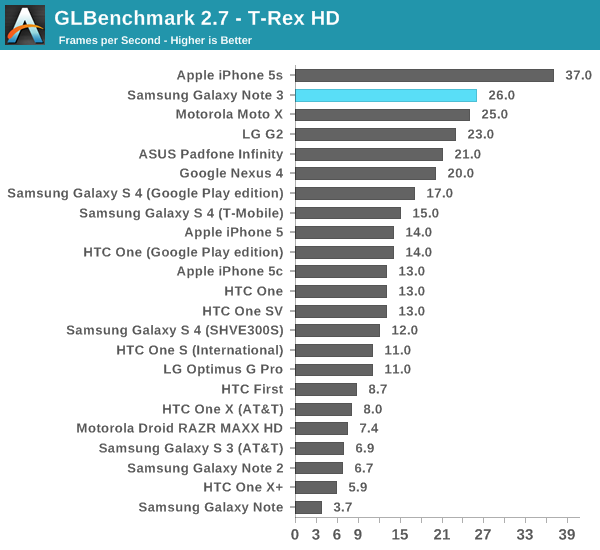
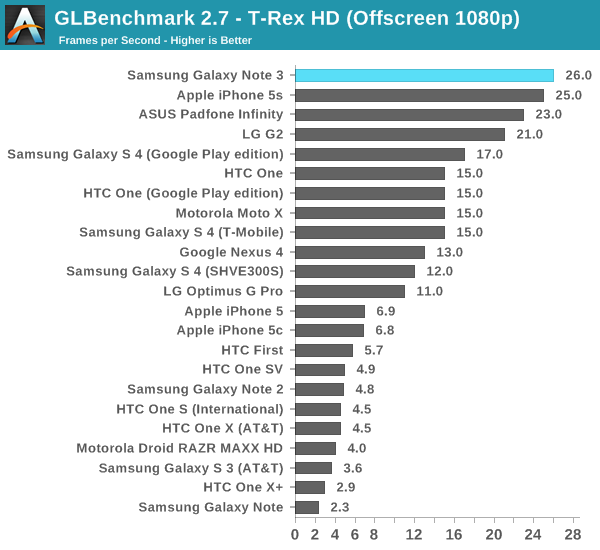
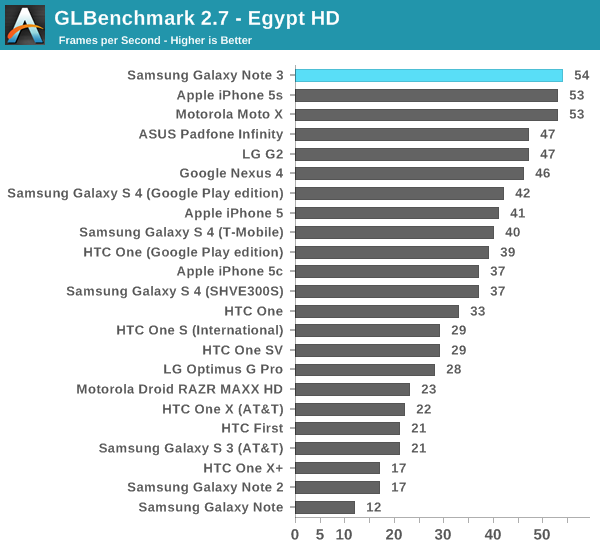
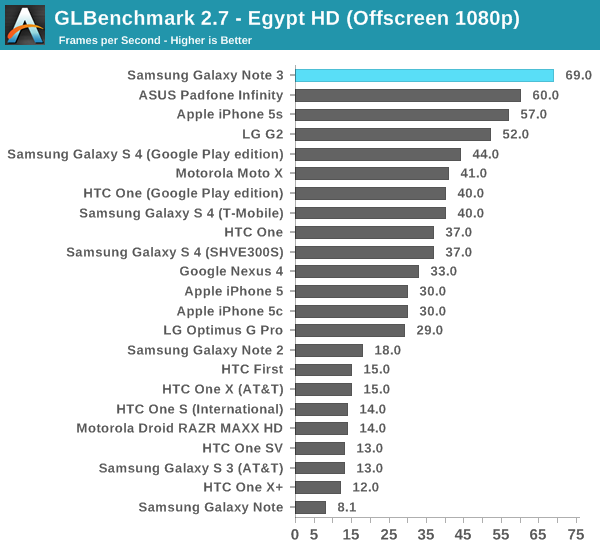
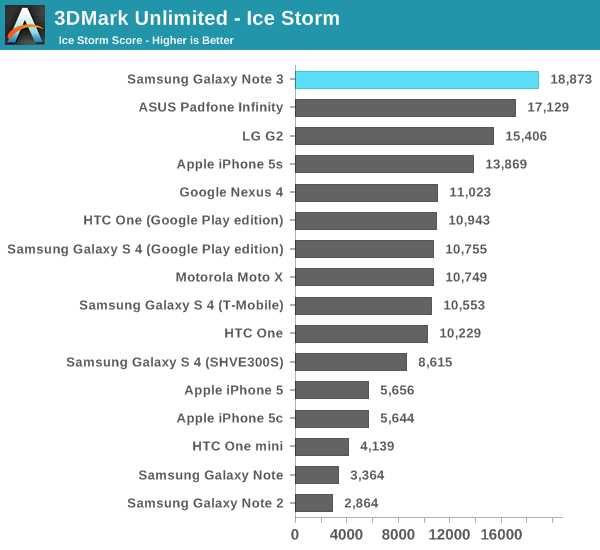
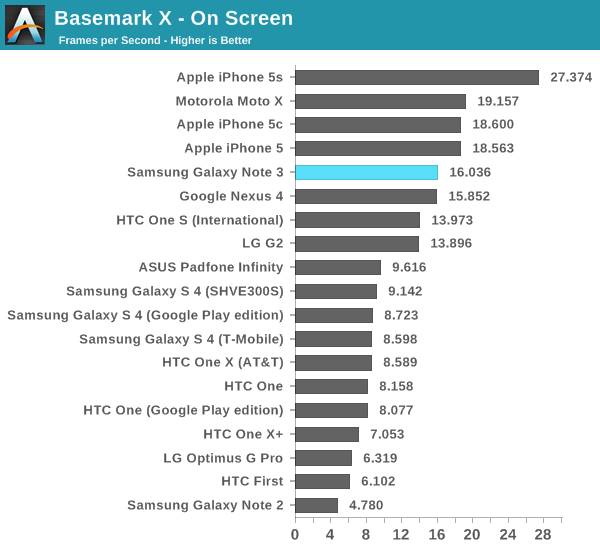
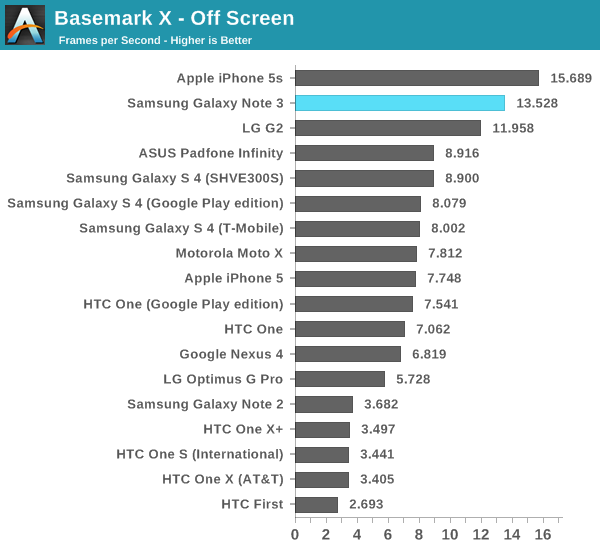
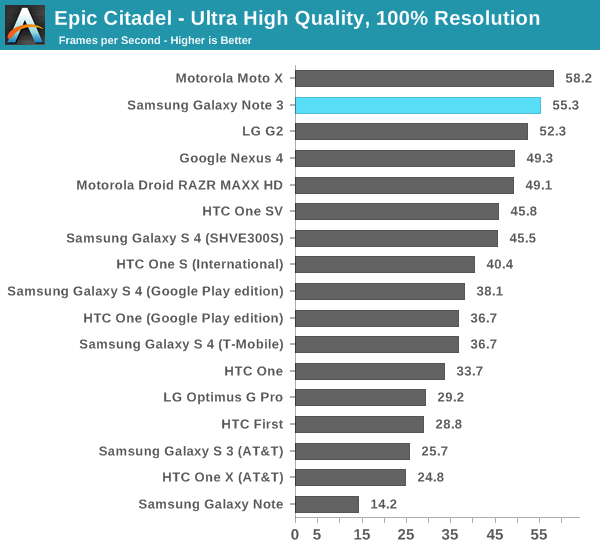
NAND & USB 3.0 Performance
Our Galaxy Note 3 review sample posted some incredible storage performance results, at least compared to all other Android smartphones we've tested. Sequential read and write performance are both class leading - the latter is nearly 2x better than the next fastest phone we've tested. Random read performance is decent, but it's random write performance that's surprising. Unlike the Moto X, the Galaxy Note 3 doesn't rely on a flash-friendly file system to get great random write performance - this is raw eMMC horsepower (if you can call ~600 IOPS that). The result isn't quite as good as what you get out of the Moto X, but it comes very close. Android 4.3 should bring FSTRIM support to the Galaxy Note 3, so as long as you remember to leave around 20% of your storage as free space you should enjoy relatively speedy IO regardless of what you do to the phone.
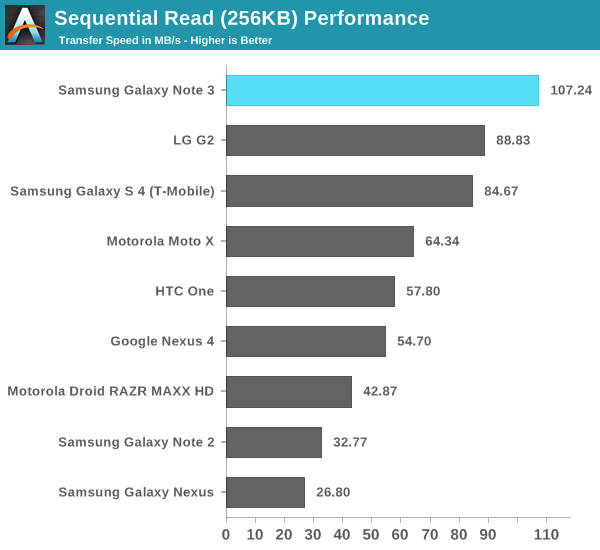
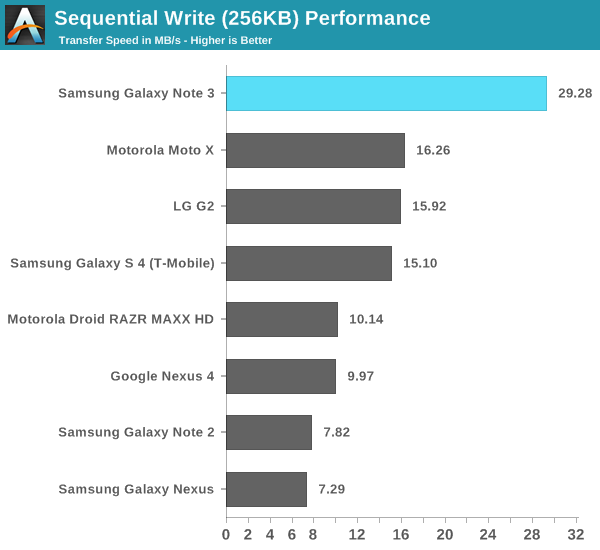
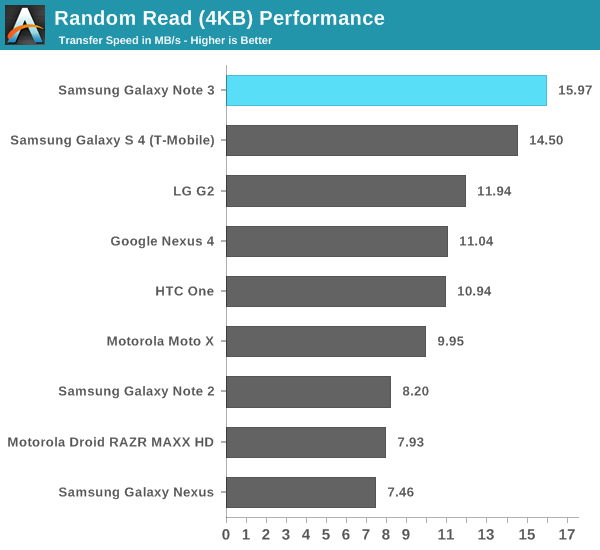
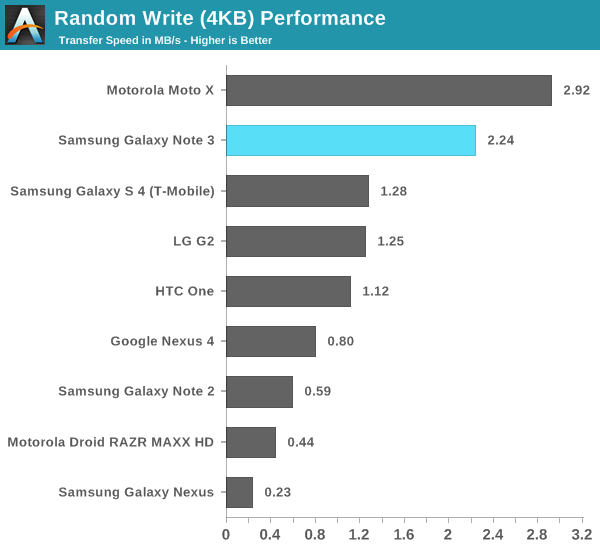
The Galaxy Note 3 ships with USB 3.0, unfortunately at least in its current state it doesn't seem to get any benefit from the interface. Although the internal eMMC is capable of being read from at ~100MB/s, sustained transfers from the device over adb averaged around 30MB/s regardless of whether or not I connected the Note 3 to a USB 2.0 or 3.0 host.
Update: USB 3.0 does work on the Note 3, but only when connected to a Windows PC with USB 3.0. Doing so brings up a new option in the "USB Computer Connection" picker with USB 3.0 as an option. Ticking this alerts you that using USB 3.0 might interfere with calls and data, but then switches over. Connection transfer speed is indeed faster in this mode as well, like you'd expect.
It only appears on Windows as well, my earlier attempts were on OS X where this popup option never appears.



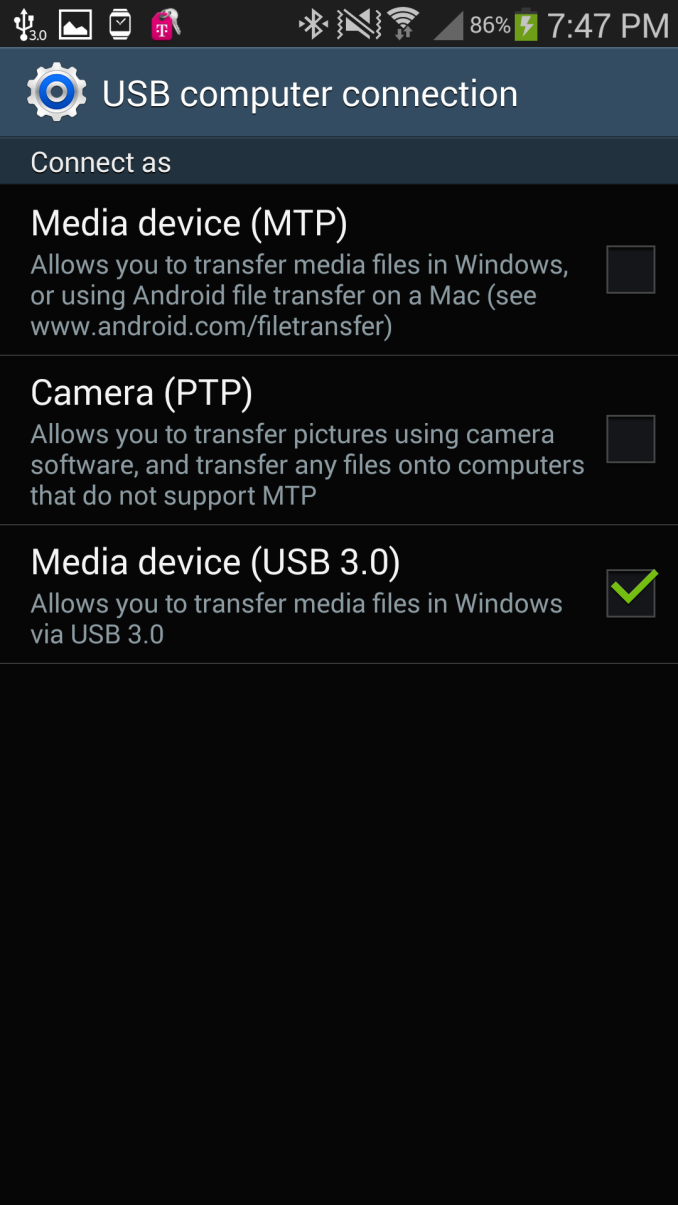
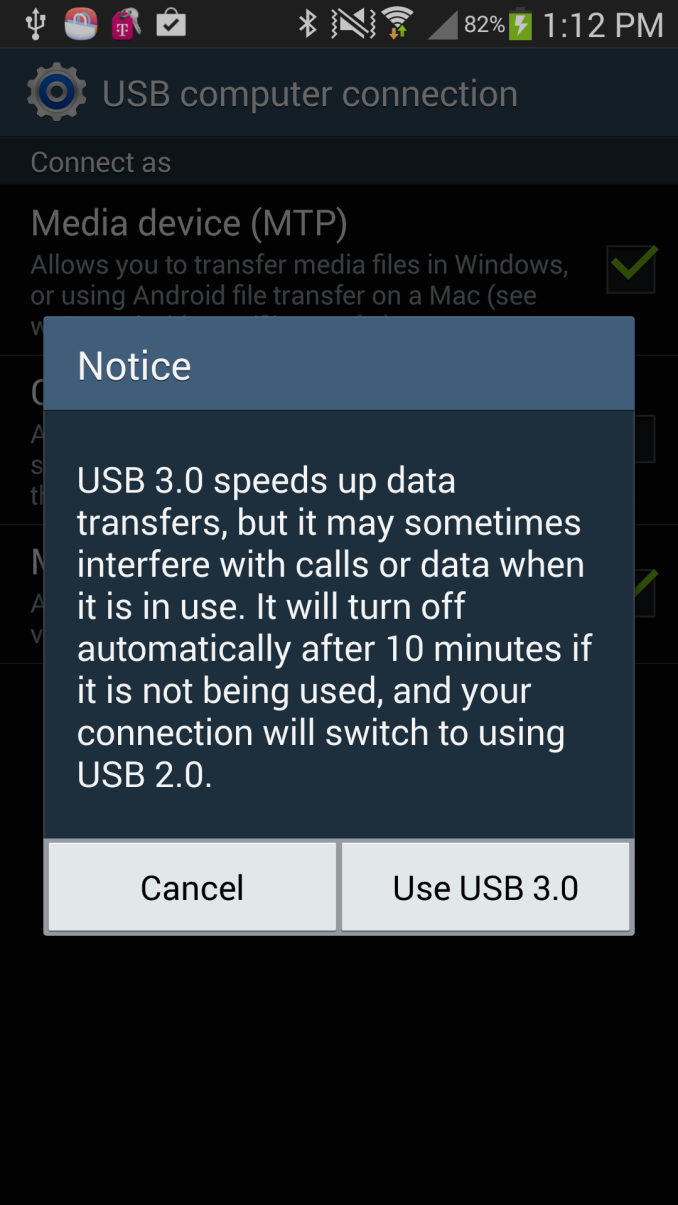








302 Comments
View All Comments
Puddlejumper - Tuesday, October 1, 2013 - link
The disappointment here on this site isn't that Samsung is cheating, the problem is that AnandTech, which some of us considered the site with the most in depth and objective analysis, is aiding and abetting Samsung.Read the review. "More or less the fastest Android smartphone we have tested". "Isn't quite as fast as the iPhone 5s but in same cases it comes close". "Note 3 manages to get the edge over the powerVR G6430 in the iPhone 5s." And worst of all many screen of benchmark date that AnandTech knew was corrupted by Samsung but couldn't be bothered to even put an asterisk bedside the phones that they knew cheated on benchmarks. Instead, the explanation in the comments is that lots of phones are doing it so we will ignore it. Pity LG, Apple, and the rest of the manufactures who tried to play straight. AnandTech is telling them to bad, you should have cheated too.
It's clear why Samsung did it. I'm just extremely disappointed with AnandTech and their defense of their actions.
golemite - Tuesday, October 1, 2013 - link
It's a sad day when Anandtech condones cheating, and let's be honest- publishing poisoned benchmark results is exactly what that is.It used to be that I trusted Anandtech to deliver straight forward and honest reviews, but apparently everyone has their price.
fusoyaii - Tuesday, October 1, 2013 - link
Thanks to whoever mentioned the Ars review. I've never really gone to their site before, but after reading their REAL review of the Note 3, I think I'm switching to them as my main review site. I've been surfing AnandTech for years upon years and always looked forward to reviews here. I read entire articles for tech I'm interested in and knew about the "optimizations" that Samsung does, but it still makes a difference when you post charts/graphs showing unrealistic "tweaked" benchmarks.You guys should look at the Ars review of the Note 3 and learn from what they're doing. Including that video showing the real world lag of the software. Waiting for the Nexus 5 now...
Spunjji - Tuesday, October 8, 2013 - link
Why not read both and make your decisions that way..?tabascosauz - Wednesday, October 2, 2013 - link
The G2 came close to the iPhone 5S's results; it's nice to see the Note 3 take the prize for Qualcomm.I guess the 5S should really get some higher clocks.
ciparis - Wednesday, October 2, 2013 - link
Brian & Anand,I suppose it's obvious from the comments: people expect you to take a stand against cheating.
Unlike you guys, HardOCP was never known for their journalistic prowess. But I have to give them credit: when someone cooked the books, these guys would come unglued. Every aspect of the cheat would be laid bare for all to see, with the community in witness. The results speak for themselves: cheating on benchmarks by altering performance characteristics is not acceptable.
The industry will only do this as long as you let it. Sometimes you have to draw a line, and take a risk. There's no guaranteed outcome. But as a reader, I have come to expect that from you. It's a compliment (I hope).
ciparis - Wednesday, October 2, 2013 - link
One more note, in case it isn't obvious: these published benchmarks on Anandtech are taken as a statement of record.As such, it seems to me that the only thing people should be seeing here are results with no performance adjustments, or where you have defeated the measures -- since the entire point is to establish the relative performance people can expect in actual use.
Blairware - Wednesday, October 2, 2013 - link
I didn't have time to read 18 pages of comments, so I hope that I'm not being redundant in mentioning a mistake in the review. There are only 2 microphones for noise cancelation. the third small hole is for temperature / humidity sensor, just like the 3rd hole on the GS4. I was surprised to see this type of error on Anandtech of all places.jgrnt1 - Wednesday, October 2, 2013 - link
Though I rarely comment, I've been coming to AnandTech for years for objective, in-depth reviews. I have to say I was concerned when AMD "bought into" the site a few weeks ago. It seemed sort of like the big donor who backs a political candidate. The candidate will always claim that no influence was bought by the donation, but it will always be in the back of your mind. Integrity and trust suffer. The minimizing of Samsung's benchmark cheating is a sign that we need to question the integrity of the reviews presented here.Anand, I realize you need to monetize the site. It is your business. You have to pay the bills. However, people have come to your site over the years only partially because of the depth of your reviews and analysis. They have also come because they believed in your integrity. They trusted you. As others have said, by posting the benchmark results in your review without strongly calling out Samsung for cheating, you have rewarded the behavior. People who read the review, but who do not read the comments, will have a much more favorable opinion of the device and of Samsung's business practices than those who go to Ars and read their article. You have let down the people who trust you to be objective.
This morning, I read the Ars article. I was then on Gizmodo and, after reading their review of the Note 3, pointed to the Ars article in my comment. Then I came here, looking forward to seeing the review doing what I knew it would do. I expected an article with a lot more depth than the Ars review, but with the same tone. Cheating is unacceptable and must be called out loudly when it occurs. Instead, there was a brief mention and then the benchmarks were presented with the inflated numbers.
I think you should redo the review with corrected benchmark results and call out Samsung for cheating. Trust in your integrity built this site. Distrust will ruin it.
Squuiid - Wednesday, October 2, 2013 - link
+1